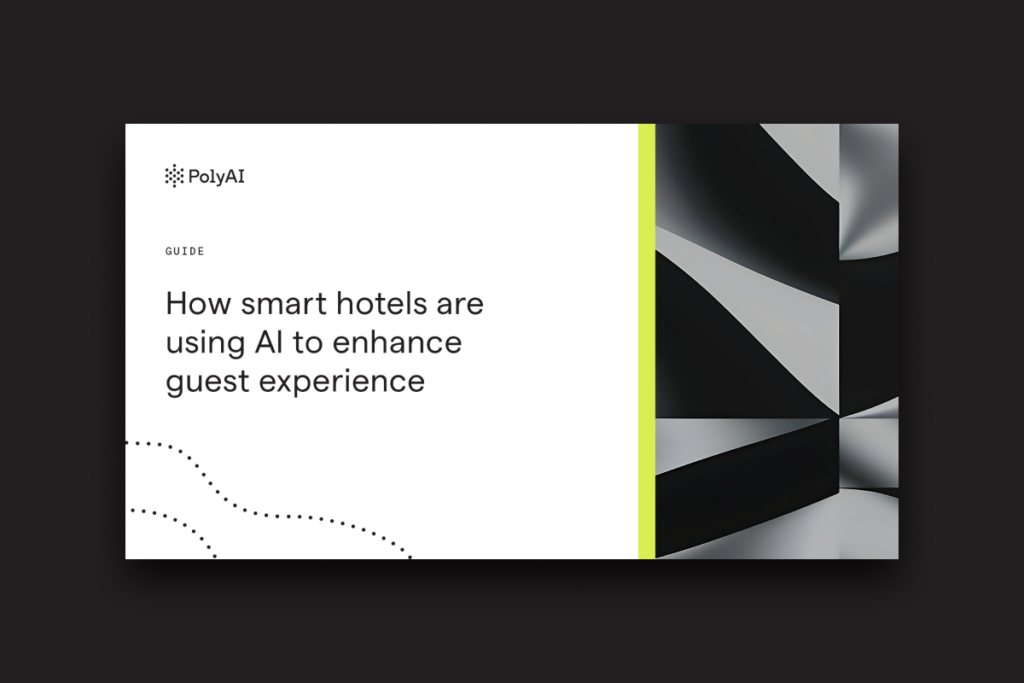Table of Contents
Hotels are under increasing operational pressure at the front desk and within the call center. Many are facing the worst staffing shortage in recent history, exacerbated by rising labor costs and high staff attrition. 87% of hotels in the United States report insufficient personnel, and 36% face a severe staff shortage.
From bookings to checking out, ensuring guest satisfaction at every stage of a guest’s experience has never been more critical for the hotel industry, especially as review sites for any hotel will be one of the first things guests see when researching a hotel’s name.
Many hoteliers are exploring AI’s potential to meet demand while ensuring guest satisfaction.
What are hotel voice assistants or bots?
A new generation of voice assistants that integrate with most hotel PBX systems presents new opportunities for self-service. Hotel voice assistants help guests with tasks over the phone by answering common questions, directing calls to the right staff or department, and even handling bookings or service requests.
These assistants use AI to understand guest needs and respond in a natural, conversational way, making it easier for hotels to manage guest inquiries efficiently while alleviating staff pressure.
Evolution of voice assistants in hospitality
Hospitality industry leaders have turned to voice automation to help, but without IVR best practices, legacy voice technologies have delivered disappointing experiences. Touch-tone and keyword-driven IVRs use preset menus that restrict how callers can explain their queries. Many customers have developed tricks to bypass conversational IVRs, shouting ‘AGENT’ or mashing their keypads in an attempt to speak directly with guest services or customer support teams.
The rise of digital hotel self-service solutions
To provide excellent guest experiences while alleviating pressure on staff, many hotels have invested in digital self-service, especially apps that allow guests to check in, book hotel rooms, browse FAQs, and make service requests without speaking with a staff member.
The reality is many guests will not download an app if they don’t have plans to visit again in the future, and while self-service options have reduced call volume to some degree, 73% of customers still call, either as a first option or following an unsuccessful digital interaction.
The Impact of AI-driven voice assistants
AI-driven voice assistants eliminate previous limitations of legacy automated systems and present new opportunities for self-service and personalization in the hotel’s guest experience anywhere. Voice assistants can handle a variety of guest interactions, including room reservations, room service requests, queries about amenities, and hotel PBX routing.
How do hotel voice assistants work?
To deliver great guest experiences over the phone that enable guests to speak naturally, a voice assistant must successfully listen, understand, and respond to what the customer is saying. This requires a specific tech stack to handle the nuances of natural conversation, including:
- Automatic speech recognition (ASR): These models translate spoken words into written transcriptions that can be digested by large language models.
- Spoken language understanding (SLU): Recover important information from incorrect speech transcriptions, using context and customer information to infer the correct input.
- Large language models (LLMs): These models can extract meaning from words and sentences and define the next steps the system should make in the context of the conversation.
- Dialogue management: A control layer that sits on top of LLMs to enable your company to have full control over transactional processes.
- Safety guardrails: A set of technical features that protect against prompt injections and other types of malicious user behavior.
- Speech synthesis: Text-to-speech (TTS) models transform text transcriptions into spoken utterances.
Five use cases for voice assistants or bots in hotels
When these technologies work together effectively, guest-led voice assistants free up hotel staff to focus on delivering a higher standard of service to in-house guests without sacrificing the quality of service customers receive on the phone.
1. Resolving billing inquiries
Many guests call with questions about their bills during their stay or in the weeks following their visit. Most are calling to get a copy of their invoice or to pre-authorize a credit card – tasks that generally need to be handled by an off-site team. Voice assistants can take these calls immediately and route callers to the correct department.
Alternatively, voice assistants can send guests an SMS containing an email address to make their requests directly or trigger an email with a copy of their bill via integrations with a hotel’s property management system.
2. Initiating housekeeping requests
Extra towels, a few bottles of water, or toiletries are among guests’ most frequently requested items when they call housekeeping teams from their in-room phones.
Voice assistants can accurately understand the requested item(s) and how many are required, regardless of factors such as accents, multilingual queries, or background noise. Integrations with telephony systems also capture a caller’s room number, enabling voicebots to initiate call center workflows without human intervention.
3. Personalizing guest experiences
Hotels that pay attention to little details create a lasting impression. Whether a guest is traveling for work or leisure, personalizing the experience is vital.
Voice assistants can help hotel brands create memorable customer experiences and enhance customer relationships. Integrations with property management systems and middleware services allow voice assistants to differentiate the experience by addressing guests with personalized messages and recognizing loyal, repeat customers.
With the option to offer CSAT surveys over the phone or via SMS, hotels can capture feedback in the moment to improve the guest experience or hotel operations.
4. Handling seasonal peaks in call volume
Call volumes may spike for predictable or unpredictable reasons. Hotels near national landmarks might experience particularly busy periods during public holidays, and resort-style hotel properties may implement special offers as part of a seasonal calendar. Unpredictable events like severe weather can require hotels to address concerns of existing and incoming guests efficiently and with little warning.
Customer-led voice assistants are trained to recognize when guests ask about particular landmarks, seasonal activities, special offers, and restaurant names. Accurately understanding caller intent enables voice assistants to resolve common, repetitive questions while allowing hotel staff to focus on the most urgent and pressing concerns.
5. Taking reservations
Front-of-house hotel staff are often tasked with managing face-to-face interactions and taking inbound calls. During busy periods, guests at the front desk take precedence, leading to missed calls, which equates to missed revenue opportunities.
By deploying a voice assistant, hotels can answer every phone call immediately. Accurately distinguishing between check-in and check-out dates, offering different room types, and taking payments over the phone eliminates the need for staff intervention.
When guests have complex requirements that need to be handled by a staff member, a voice assistant can gather basic information such as the guest’s name, date of birth, or party size while they wait to be served.
Benefits of using voice assistants in hospitality
Here are some of the ways a voice assistant creates value for hotels.
Increase capacity
As hotels approach pre-pandemic occupancy levels, with less staff, efficient management of guest requests becomes critical.
Reservations, inquiries about room availability, check-out times, and questions about restaurant opening hours are just some of the questions and transactions a voice assistant can handle. During high call volume and seasonal spikes in demand, your staff has fewer routine inquiries to handle. They can focus on delivering tailored experiences, like arranging special celebrations or surprise reservations.
Consistent and welcoming experiences over the phone
Whether guests call to make a reservation or order room service, they expect a welcoming interaction, not a robotic voice. If a guest does not feel comfortable engaging with the automated solution on the phone, they will insist on talking to someone, offsetting the benefits of automation and adding to the busy role of front-of-house staff.
Voice assistants should replicate the ease and comfort of speaking with a knowledgeable concierge, front desk, or central reservations team member. Guests should be able to make reservations, request housekeeping, and inquire about services and facilities without feeling constrained.
Alleviate staff pressure with guest insights
Every guest interaction creates insights highlighting trends in guest requests, enabling you to streamline operations. Frequent guests may have particular room preferences and dietary requirements. These insights empower staff to create a more efficient and personalized reservation experience by enabling real-time responses to guest needs.
Voice assistants surface actionable insights that help predict demand patterns accurately, including historical booking data, seasonal trends, and guest preferences. Access to structured conversational data helps hotel management optimize staffing, update housekeeping schedules, and train staff, reducing the need for additional staff.
Respond faster
Fast response times are critical to delivering 5-star guest experiences. Rapid response times can be the difference between securing bookings and losing potential guests. Voice assistants allow hotels to promptly handle incoming calls, address FAQs, and provide information on pricing and availability. Where staff input is needed, a voice assistant can gather essential guest information before correctly routing the call to a staff member, significantly reducing the time it takes to resolve the guest’s query.
Why hotels love PolyAI
PolyAI voice assistants are reshaping the guest experience and driving more revenue opportunities over the phone. From automating reservations, to answering site specific and brand-level FAQs, and automating housekeeping requests. By easily integrating with a hotel’s existing PBX, external and internal calls can be routed efficiently.
The call recording below shows a PolyAI voice assistant’s effectiveness in engaging in a natural, guest-led conversation.
With a PolyAI voice assistant, each guest experience is personalized. By recognizing loyalty status and offering custom greetings or priority service based on that status— hotels can dramatically reduce long wait times.
The structured data from each call also helps hotels track how guests interact with the voice assistant to identify areas for improvement, and measure guest satisfaction with the phone service.
How Golden Nugget automates 34% of hotel reservation calls with a PolyAI voice assistant
Read the case studyPolyAI and Fourteen IP built a new hotel concierge voicebot, Evolution Virtual Agent or ‘EVA’, and deployed it across properties at Marriott, Hilton, Hyatt and Choice Hotels. Find out how we did it in this on-demand webinar, which features multiple call recordings of real interactions between hotel guests and a PolyAI voice assistant >
Hotel voice assistant FAQs
Using a hotel voice assistant helps with:
- Faster service: Guests get quick responses to common questions and requests, cutting down on wait times.
- Efficiency: It handles routine tasks like reservations, billing, and housekeeping requests, so staff can focus on more important tasks.
- Consistent experience: Voice assistants provide the same level of service every time, which helps keep guest experiences smooth and reliable.
- Reducing staff workload: They take care of many guest inquiries automatically, easing the pressure on hotel staff, especially during busy periods or when there’s a staff shortage.
- Valuable insights: Voice assistants track guest interactions, helping hotels identify trends and improve services based on real data.
If a guest prefers to speak with a human, voice assistants are designed to seamlessly transfer calls to hotel staff while collecting important information beforehand to minimize wait time and streamline the guest’s request.
Voice assistants take over routine tasks, such as answering common questions, handling room service requests, and managing reservations. This frees up hotel staff to focus on high-priority guest needs, alleviating pressure during peak periods or staffing shortages.




